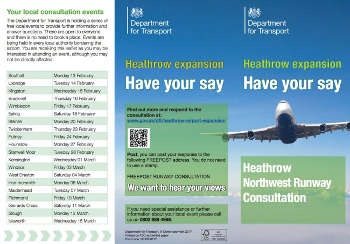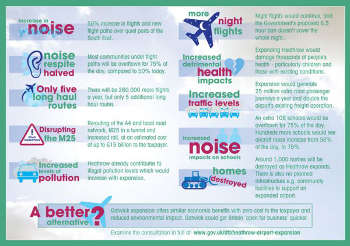Councils have been making the news lately by accusing central government organisations of giving their residents misleading information about controversial infrastructure projects.
But are the councils being too precious? Aren’t they themselves spinning a line? Isn’t everyone?

The DfT's Heathrow consultation leaflet
Local authorities in West London and beyond that oppose the Government’s ‘preferred option’ of a new runway at Heathrow airport have encouraged their residents to take part in the current Government consultation while criticising the information given to them.
Hammersmith and Fulham Council put out a statement ‘urging residents to speak out’ about the plans, via the consultation.
Council leader Stephen Cowan added: ‘Expanding Heathrow would damage the borough and we don’t support it’, leaving little doubt that when the council said ‘speak out’, it really meant ‘speak out against’.
Hillingdon Council has gone a step further. It criticised a leaflet sent by the Government to 1.5 million homes around the airport for ‘listing estimated economic benefits and total sums available for damage mitigation but providing no real facts to enable residents to consider how this development would affect either their lives or the local environment’.
It said the leaflet was ‘misleading’ and ‘doesn't provide sufficient information to allow consultees to make a proper informed response on issues, such as increasing aircraft noise levels, illegal pollution levels, health impacts, costs to the taxpayer, traffic increases or the loss of noise respite periods’.
To ensure that residents were aware of ‘the detrimental environmental impacts that the Government's publicity leaflet failed to include’, it published its own leaflet.
Hillingdon also criticised the Government for not revealing the airport's new flight paths, ‘so people cannot tell if their home, schools or communities will be beneath a new landing or take-off route or how many times a day flights will occur’.
This theme was taken up by Richmond Council, which got its retaliation in by adding that examination of online consultation documents shows that ‘flight path communities’ would be overflown for around 75% of the day, up from 50% currently.

Hillingdon's less positive view of Heathrow expansion's impacts
Council leader Lord True called the Government leaflet ‘propaganda in its finest’, which we must take as criticism.
He added that the Government ‘should be proactively informing flight path communities about major changes like the loss of daytime respite periods but that’s not been their approach’.
No one would disagree that any consultation should give the full facts and indeed inadequate consultations have led to successful legal challenges – but are councils also engaging in propaganda, not to mention hypocrisy, by only highlighting the negatives of the projects they oppose?
And whose residents are they, anyway? This question arose earlier in the week when three party leaders at Thurrock Council bitterly criticised Highways England for ‘again’ writing to residents without informing the council.
The source of the problem was a letter setting out plans for the Lower Thames Crossing, from Kent to Essex.
In their own letter to the government-owned company, the leaders wrote: ‘By ignoring the role of the local authority, elected members and officers, in ensuring our residents are well informed and have the right information to be clear on what is happening with the future of the Lower Thames Crossing, you are undermining the strategic partnership which should exist between our organisations.’
They added: ‘It is with outrage – if not surprise – that we find ourselves having to write again to lodge a formal complaint about your repeated approach to communicating with our local community without our prior knowledge which demonstrates a lack of respect for the council’s community leadership position.’
Are councillors, who have unanimously voted to oppose plans for a further river crossing in Thurrock, protesting too much here?
Perhaps, but Thurrock’s leader, Cllr Rob Gledhill, did point out that: ‘Without an announcement on the route, to send letters to residents completely out of the blue will no doubt cause them concern.’
This brings us back to complaints around the Heathrow consultation not stating what flight paths will be. In consulting residents who might be affected, the starting point must be to what extent, if at all, they will be affected.
In its defence, Highways England subsequently said that it had phoned the council, was keen to work with it at every stage, and recognised ‘the vital role the council plays in delivering a new Lower Thames Crossing’.
For national governments and organisations seeking to build new infrastructure schemes that are as likely as not to be opposed by those in whose back yard they fall, this raises something of a paradox.
Councils represent local communities and are likely to have a closer understanding of their feelings and interests. However they cannot claim a monopoly on contact with citizens. National agencies, like Highways England, have to ensure locals know that they are listening to their concerns too.
We know that governments can be tempted to stress the positives of schemes they support, even when consulting on them. And we know that all sides in an argument are capable of spinning the facts to support their case, which can include accusing the other side of providing incomplete or misleading information.
It should be possible to communicate constructively with local residents through councils and the courtesy of contacting a local authority can not only avoid controversy but also be constructive and have practical uses. Coordination of what, in all honesty, may be opposing views, might be one way to ensure residents get a balanced argument.
It can undoubtedly be a bit of a minefield. It is not fair for either national or local authorities to demand the other side asks their permission. Equally it is fair for residents to expect them to work together as best as they can. After all, who is paying for all these leaflets?
I think that sums it up fairly…
Register now for full access
Register just once to get unrestricted, real-time coverage of the issues and challenges facing UK transport and highways engineers.
Full website content includes the latest news, exclusive commentary from leading industry figures and detailed topical analysis of the highways, transportation, environment and place-shaping sectors.
Use the link below to register your details for full, free access.
Already a registered? Login